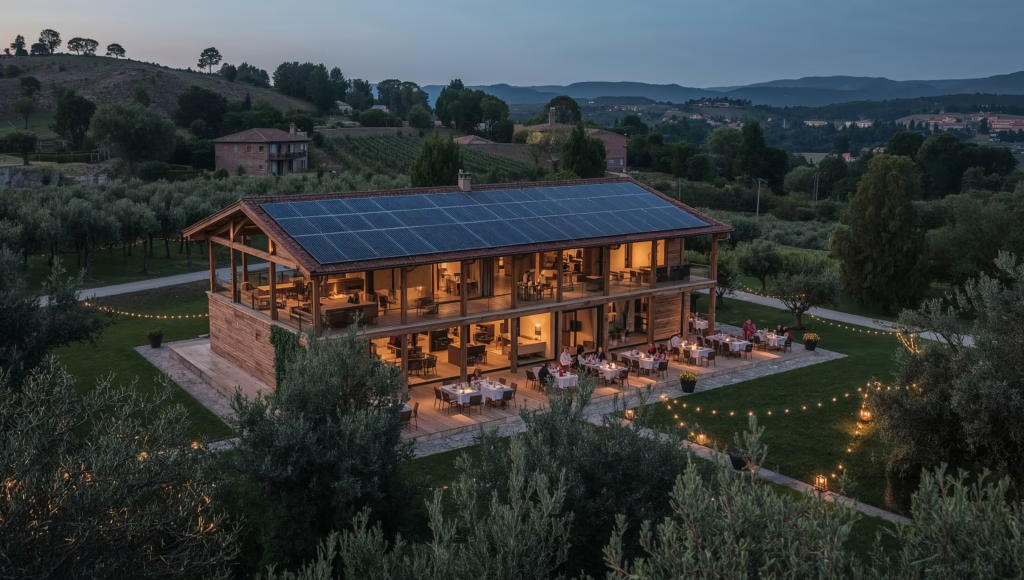In an era where climate change headlines dominate the news, travelers are no longer just looking for beauty and culture in their vacations—they’re seeking sustainability. Italy, a country deeply tied to its landscapes, cuisine, and cultural heritage, is embracing a greener path. Enter green tourism and the rise of eco labels, which are quickly becoming the gold standard for conscious travel.
Whether it’s choosing accommodations certified for energy efficiency or opting for locally guided experiences that support conservation, eco labels are guiding decisions in 2025 like never before.
What Is Green Tourism?
Green tourism, often referred to as sustainable or eco-tourism, prioritizes:
- Environmental protection
- Cultural preservation
- Economic benefit for local communities
It’s about minimizing the negative impact of travel while maximizing its positive contributions.
In Italy, this movement is rooted in both tradition and innovation—from agriturismi powered by solar panels to vineyards using organic methods passed down for generations.
The Power of Eco Labels
Eco labels are certifications or recognitions awarded to businesses, services, or destinations that meet rigorous environmental and sustainability standards. They simplify green travel by helping tourists identify:
- Eco-friendly hotels
- Sustainable transport options
- Responsible tour operators
- Locally sourced food and products
Examples of well-known eco labels in Italy include:
- Legambiente Turismo
- EU Ecolabel
- Green Key
- CETS (European Charter for Sustainable Tourism in Protected Areas)
Each of these labels is more than a sticker—they’re backed by audits, criteria, and a commitment to continuous improvement.

How Eco Labels Are Changing Visitor Behavior
1. Accommodation Choices
More travelers now filter hotel options by sustainability. In fact, according to a 2025 Vexo Italy customer survey, 68% of clients said eco certifications impacted their booking decisions.
Popular eco-certified options in Italy include:
- Eco hotels that use renewable energy and low-flow water systems
- Agriturismi that grow organic produce and recycle waste
- B&Bs that offer locally made toiletries and eco-friendly cleaning products
2. Transport Preferences
From carbon-offset train travel to hybrid car rentals and e-bike tours, Italy is seeing a boom in green mobility. Cities like Bologna and Milan offer incentives for low-emission vehicles, and regions such as South Tyrol promote “car-free holidays.”
Eco labels help identify:
- Train routes and providers with low carbon footprints
- Bus services with emissions tracking
- Hotels that provide electric car charging
3. Food & Wine Experiences
Green travelers are increasingly seeking farm-to-table dining, biodynamic wineries, and cooking classes using regional produce.
Eco-certified dining experiences often feature:
- Seasonal menus
- Food waste reduction practices
- Support for local farmers and artisans
4. Tour Activities and Excursions
Italy’s nature parks, UNESCO sites, and marine reserves now host guided experiences certified by environmental organizations. These might include:
- Wildlife tours with conservationists
- Low-impact hiking and kayaking excursions
- Heritage walks supporting cultural preservation
Vexo Italy partners with tour operators who follow Leave No Trace principles and engage with local communities directly.
Case Study: Cinque Terre’s Sustainable Turnaround
Cinque Terre’s fragile cliffs and centuries-old paths were once under threat from unchecked tourism. In recent years, the region adopted a strict sustainability charter that limits visitor numbers, mandates eco-certification for tour providers, and rewards tourists who travel by train.
As a result, the area has seen:
- Improved trail preservation
- Less litter and pollution
- Higher visitor satisfaction from meaningful, uncrowded experiences
Why Eco Labels Matter for Travelers
Eco labels cut through the noise of marketing. They provide assurance that a hotel, tour, or product meets standards of:
- Energy efficiency
- Waste management
- Water conservation
- Local community support
- Cultural respect
They help travelers align their values with their spending—ensuring their vacation contributes to the solution, not the problem.
Tips for Green Travel in Italy
- Look for Certification: Use platforms that filter eco-labeled options or check directly on hotel/tour websites.
- Ask Questions: Don’t hesitate to inquire about sustainability practices.
- Go Off the Beaten Path: Support less-visited destinations to reduce pressure on hotspots.
- Stay Longer: Slow travel reduces transportation impact and deepens your experience.
- Support Local: Choose family-owned businesses, local guides, and artisan products.
Vexo Italy’s Green Promise
At VexoItaly.com, we believe that travel should enrich both the traveler and the destination. That’s why we:
- Partner only with eco-labeled accommodations and experiences
- Offset the carbon footprint of every custom itinerary
- Curate trips with minimal environmental impact
- Educate travelers on sustainable practices before and during their journey
Whether you’re cycling through the vineyards of Piedmont or relaxing in an eco-lodge in Sicily, we make it easy to travel responsibly—without sacrificing luxury, comfort, or wonder.
Final Thoughts: Sustainability is the New Luxury
Green tourism isn’t about sacrifice—it’s about intention. It’s about choosing experiences that resonate beyond Instagram and contribute to a healthier planet and richer human connections.
Eco labels are more than symbols. They’re signals of a global shift in how we explore the world. And in Italy—a country where tradition meets beauty—they’re leading the way toward a more thoughtful future.
Ready to explore Italy the green way? Discover Vexo Italy’s curated sustainable experiences at vexoitaly.com.
